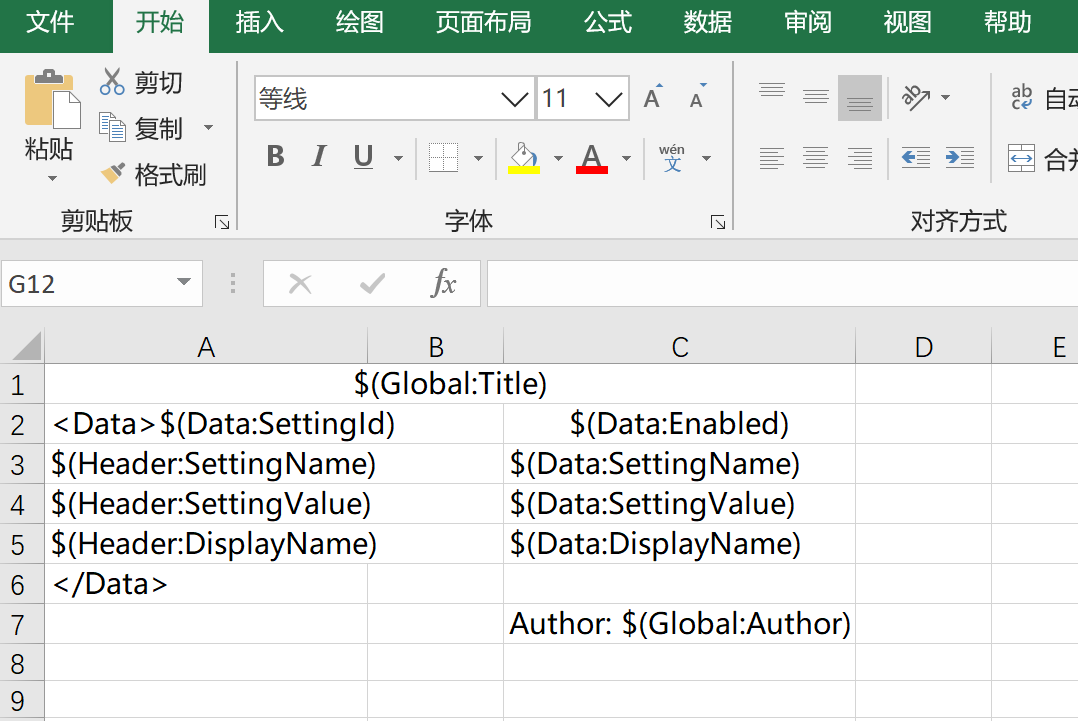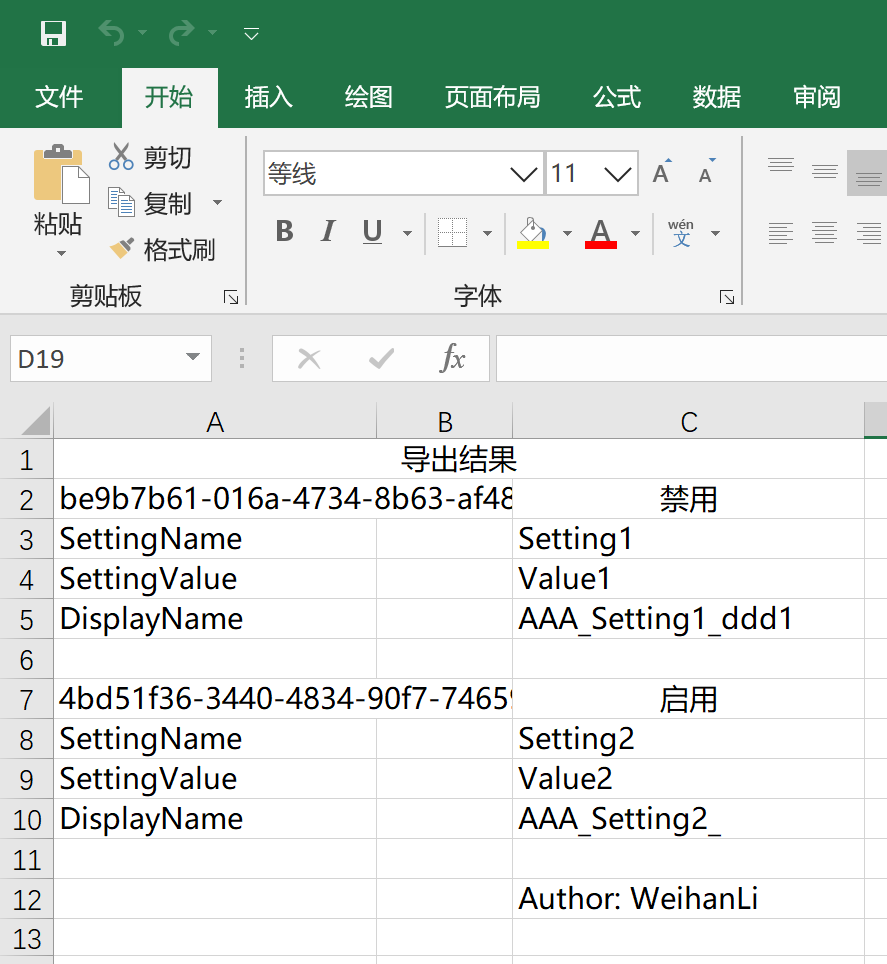WeihanLi.Npoi export Excel template according to
Intro
The original way to export more suitable for relatively simple export data in each row, column data although relatively high degree of customization, if the data correspond to a multi-line can not do, so he wanted to support the export based on the template, 1.8. 0 version introduced in accordance with the template export function
Examples of Use
A sample template

Planning template can have three kinds of data:
- Global: a is derived when you can specify parameters as Global parameters, the default parameter format:
$(Global:PropName)format - Header: the name of the corresponding attribute display configuration, a default attribute name, format default parameters:
$(Header:PropName) - The Data: The data corresponding to the attribute value default parameter format:
$(Data:PropName)
The default template parameter format (from the beginning supported by version 1.8.2 TemplateHelper.ConfigureTemplateOptionsfrom the definition method):
- Global parameters:
$(Global:{0}) - Header parameters:
$(Header:{0}) - Data parameters:
$(Data:{0}) - Data Begin:
<Data> - Data End:
</Data>
Template specification:
Needed to configure the data template by the template and Data End Data Begin to identify the beginning and end of each data corresponding to the start and ending lines
Sample Code
Sample configuration
var setting = ExcelHelper.SettingFor<TestEntity>();
// ExcelSetting
setting.HasAuthor("WeihanLi")
.HasTitle("WeihanLi.Npoi test")
.HasDescription("WeihanLi.Npoi test")
.HasSubject("WeihanLi.Npoi test");
setting.HasSheetConfiguration(0, "SystemSettingsList", 1, true);
setting.Property(_ => _.SettingId)
.HasColumnIndex(0);
setting.Property(_ => _.SettingName)
.HasColumnTitle("SettingName")
.HasColumnIndex(1);
setting.Property(_ => _.DisplayName)
.HasOutputFormatter((entity, displayName) => $"AAA_{entity.SettingName}_{displayName}")
.HasInputFormatter((entity, originVal) => originVal.Split(new[] { '_' })[2])
.HasColumnTitle("DisplayName")
.HasColumnIndex(2);
setting.Property(_ => _.SettingValue)
.HasColumnTitle("SettingValue")
.HasColumnIndex(3);
setting.Property(x => x.Enabled)
.HasColumnInputFormatter(val => "启用".Equals(val))
.HasColumnOutputFormatter(v => v ? "启用" : "禁用");
setting.Property("HiddenProp")
.HasOutputFormatter((entity, val) => $"HiddenProp_{entity.PKID}");
setting.Property(_ => _.PKID).Ignored();
setting.Property(_ => _.UpdatedBy).Ignored();
setting.Property(_ => _.UpdatedTime).Ignored();According to Export template sample code:
var entities = new List<TestEntity>()
{
new TestEntity()
{
PKID = 1,
SettingId = Guid.NewGuid(),
SettingName = "Setting1",
SettingValue = "Value1",
DisplayName = "ddd1"
},
new TestEntity()
{
PKID=2,
SettingId = Guid.NewGuid(),
SettingName = "Setting2",
SettingValue = "Value2",
Enabled = true
},
};
var csvFilePath = $@"{tempDirPath}\test.csv";
entities.ToExcelFileByTemplate(
Path.Combine(ApplicationHelper.AppRoot, "Templates", "testTemplate.xlsx"),
ApplicationHelper.MapPath("templateTestEntities.xlsx"),
extraData: new
{
Author = "WeihanLi",
Title = "导出结果"
}
);Export Results

More
For ease of use, adds some handy extension methods:
public static int ToExcelFileByTemplate<TEntity>([NotNull]this IEnumerable<TEntity> entities, string templatePath, string excelPath, int sheetIndex = 0, object extraData = null);
public static int ToExcelFileByTemplate<TEntity>([NotNull]this IEnumerable<TEntity> entities, byte[] templateBytes, string excelPath, ExcelFormat excelFormat = ExcelFormat.Xls, int sheetIndex = 0, object extraData = null);
public static int ToExcelFileByTemplate<TEntity>([NotNull]this IEnumerable<TEntity> entities, IWorkbook templateWorkbook, string excelPath, int sheetIndex = 0, object extraData = null);
public static byte[] ToExcelBytesByTemplate<TEntity>([NotNull]this IEnumerable<TEntity> entities, string templatePath, int sheetIndex = 0, object extraData = null);
public static byte[] ToExcelBytesByTemplate<TEntity>([NotNull]this IEnumerable<TEntity> entities, byte[] templateBytes, ExcelFormat excelFormat = ExcelFormat.Xls, int sheetIndex = 0, object extraData = null);
public static byte[] ToExcelBytesByTemplate<TEntity>([NotNull]this IEnumerable<TEntity> entities, Stream templateStream, ExcelFormat excelFormat = ExcelFormat.Xls, int sheetIndex = 0, object extraData = null);
public static byte[] ToExcelBytesByTemplate<TEntity>([NotNull]this IEnumerable<TEntity> entities, IWorkbook templateWorkbook, int sheetIndex = 0, object extraData = null);
public static byte[] ToExcelBytesByTemplate<TEntity>([NotNull]this IEnumerable<TEntity> entities, ISheet templateSheet, object extraData = null);